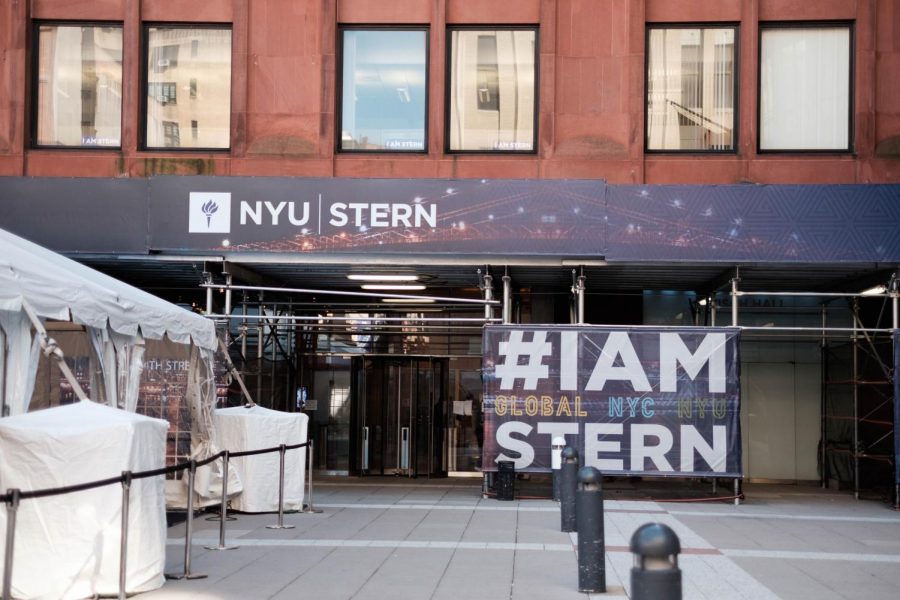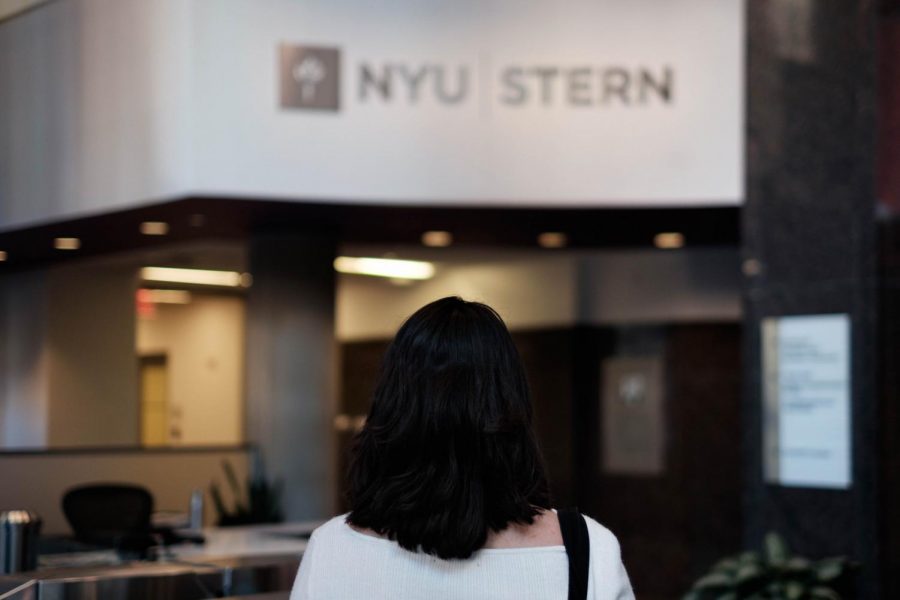Racial Discrimination and Islamophobia Pervasive in Stern
A Muslim student standing in the lobby of the Henry Kaufman Management Center. Stern has recently gained attention from the larger NYU community due to instances of Islamophobia and discrimination.
Stern senior Essma Bengabsia was sitting at a booth with other members of her club, Islamic Finance Group, during a club fair on Jan. 24 when a Stern student approached them and asked if they were recruiting for ISIS.
For the predominantly Muslim club focused on Islamic finance and business in the Muslim world, incidents like this aren’t uncommon. Fellow students often ask members of the group’s executive board who don’t wear hijabs whether they are real Muslims, and the president of another club, the Stern Political Economy Exchange, asked IFG if they wanted to co-sponsor an event titled “ISIS Militants in Europe.”
Despite numerous attempts to report discrimination to the administration of the Stern School of Business, IFG club members said they have seen no disciplinary response from the university.
Through interviews with nine students, four administrators and one member of Stern’s faculty, WSN found a culture of subtle, and often overt, discrimination and ostracization by classmates and faculty within Stern that impacts more than just Muslim students.
In recent weeks, Bengabsia and other members of IFG have brought these ongoing issues of diversity and inclusion to Stern’s Student Council, the college’s administration and, just last Thursday, to President Andrew Hamilton at a public town hall. Bengabsia started a spreadsheet this semester where she has been tracking the details of Islamophobic incidents that she reports to the university.
The Stern administration has recently reacted — coordinating a 15-minute meeting between Stern administrators and Associate Vice President for Student Affairs and Diversity Initiatives Monroe France. There will also be a community meeting on Monday, April 23 at 5 p.m. during which students will have a forum to bring up concerns, according to Assistant Dean of Students, Engagement & Innovation Ashish Bhatia.
For the four percent of black students that comprise the population of Stern, similar issues of bias and discrimination make the climate uncomfortable. From stares in the classroom to the use of the n-word in the hallways, Stern junior Sarah Mengual spoke to WSN about the microaggressions — actions or statements that indirectly or subtly discriminate against members of a marginalized group — and overt racism she has experienced in Stern as a black student.
“Every time I entered Stern, I felt like someone was staring at me,” she said. “At some points, I had the urge to tape my ID to my forehead so people know I go here.”
Mengual, who was interested in accounting when she started at NYU, went to her first and last Stern club fair the fall of her first year. As she walked around, she said she felt eyes on her constantly; students asked her if she was in the right place. She left the club fair shortly after entering and for months, she felt like she didn’t fit in anywhere in Stern.
The lack of community almost drove her to transfer. But at the end of her first year, she found Supporting Excellence and Advocating Diversity, a student organization dedicated to making Stern more diverse and inclusive. Now vice president of the group, she mentors first-year students that belong to underrepresented groups through the Academic Achievement Program.
“There was a club for students of color and I didn’t know that, no one advertised it to me,” Mengual said. “It was brown and black students. It was such a safe space for me.”
Over the three years she has been at Stern, Mengual said the lack of integration of students of color has persisted. She sees the scarce progress reflected in the fact that current first-years still encounter similar issues of discrimination.
“Speaking to freshmen now that I mentor, it’s still a thing,” Mengual said. “Things haven’t changed.”

Despite the implementation of mandatory diversity trainings for first-years in Stern as of two years ago, first-year student Raneen Khalil experienced explicit Islamophobia within one semester at Stern. On one occasion Khalil was told that “all Muslims are terrorists” by an international student in one of her classes. None of Khalil’s classmates said anything.
“I didn’t know what to say,” Khalil said. “So I said ‘No, not all Muslims are terrorists.’ And she said, ‘No, no. I know you’re not.’ And then she went on with her day.”
As one of a handful of hijab-wearing Muslim women in Stern, Khalil has grown accustomed to acts of discrimination. Oftentimes manifesting quietly — through stares in the hallway, strange looks from classmates when she answers a question correctly or students avoiding the seat next to her in lectures. Stern has become an uncomfortable place for her.
“Every time I walk in, there is this burden that something might happen,” Khalil said. “I’m always on high alert. It’s like, who’s looking at me? Why are they looking at me? I’m supposed to study and not care and make friends, but I walk in and all I have to focus on is keeping myself safe. I just don’t want to go into the building.”
Even when students like Khalil and Mengual managed to find a club that welcomes them, discrimination continued to be a prominent issue. Although she has been a part of SEAD for two years, Mengual said she still feels ostracized by the Stern community.
Last semester, the Business Analytics Club reached out to SEAD to co-sponsor a talk about diversity and inclusion. While SEAD’s members were present at the talk, only the president of BAC attended.
“We have our room, we’re sitting there, 15 people come in and take a look around and walk right back out,” Mengual said. “People just kept coming in and then leaving. The rest of the meeting was just SEAD members.”
SEAD members have also experienced explicit racism when trying to recruit for the organization.
“We’ve invited people to join [SEAD] and had them say ‘I’m not comfortable because there are a lot of black students,’” Mengual said.
Although Khalil never reported the incident from her class because she didn’t know how to, she has worked with Bengabsia to bring these issues to the attention of the Office of Student Engagement. Mengual has also had conversations with OSE about her experiences.
Classmates and fellow Stern clubs aren’t the only source of such comments and actions. A number of students reported insensitive and discriminatory comments from faculty in the classroom setting.
Three students mentioned Economics Professor Joseph Foudy, telling WSN that he often makes fun of racial politics and inappropriately addresses students of color during class.
One student told WSN that in a lecture, Foudy confused the names of two Asian students and when he was corrected said, “you look the same.” Foudy did not deny this allegation.
“I certainly make a lot of mistakes in names because of the number of students I have,” Foudy said to WSN. “I don’t recall that, but if I did, I’m quite apologetic.”
Another student expressed discomfort with the fact that Foudy often makes fun of microaggressions during classes.
“I certainly make jokes about the term ‘microaggression,’” Foudy said. “I have students who come to my office everyday with really tough issues — deaths in the family, mental illness, things like that … I have students who have really tough life or death issues. I have students who are working two jobs to afford college.”
Foudy said he has attended lunch meetings with faculty discussing diversity and inclusion.
“It’s hard because he’s a very distinguished faculty member at Stern,” Stern senior and SEAD President Nana Apraku said. “He’s won faculty awards, he runs a lot of departments, he’s very high up in the [Economics] department. How can we ask him to respond to these issues that the university doesn’t even respond to? Foudy is someone we need to have conversations about, he’s been problematic.”
Upon joining Stern, faculty are required to partake in diversity training, and in 2016, diversity training events were offered for faculty, but they were not made mandatory, according to Vice Dean of Faculty Elizabeth Morrison.
Morrison acknowledged the lack of faculty diversity within Stern — data from the 2017 Equity, Diversity and Inclusion Taskforce report details how 68 percent of Stern’s tenure or tenure-track faculty are white, 77 percent are male and there were too few black faculty to make up a percentage in the dataset. She said Stern implemented a hiring plan two years ago which includes targets for staff diversity.
Stern’s Diversity in Context
Tenured/Tenure-Track Ethnicity at Stern
Tenured/Tenure-Track Gender at Stern
Undergraduate Enrollment by Race/Ethnicity at Stern
Stern’s faculty is noticeably homogenous. Nearly 70 percent of tenured and tenure-track faculty are white, 16 percent are Asian and there are not enough black faculty to count. About two percent of faculty are Hispanic or Latino. There is also a significant gender imbalance among faculty at Stern. Tenured and tenure-track faculty in Stern are nearly 80 percent male, the second highest percentage among all NYU schools.
Stern similarly sees low percentages of black and Hispanic students. Four percent of its students are black, tied for the lowest percentage among all NYU schools and 11 percent of its students are Hispanic, tied for third lowest among all NYU schools. Stern also has the lowest percentage of white students of any NYU school at 18 percent. Though the business school boasts the highest percentage of international students, the racial makeup of those students is unclear. A white student from England and an Asian student from Thailand are both considered international students under NYU’s definition. Stern’s demographics serve as a backdrop to students’ allegations of racism and a lack of diversity in academic curricula.
* Inferred from the visuals of the Report of the Ad Hoc Advisory Task Force on Equity, Diversity, and Inclusion (April 27, 2017)
Information via Ad Hoc Advisory Task Force on Equity, Diversity, and Inclusion (April 27, 2017)
Reports to the Bias Response Line — a platform for NYU community members to report instances of discrimination, bias or disparate treatment — or the Stern administration concerning faculty come back to Morrison, but she said reports similar to the ones detailed by these students have not reached her.
“There haven’t been a lot and that does raise some questions in my mind about if students are not reporting these things or if they’re not getting to me,” Morrison said. “I haven’t received information on any incidents that seem similar to what these students have reported. Nothing having to do with discriminatory or inappropriate comments toward students of color or Muslim students.”
Bengabsia has been bringing these issues to the Office of Student Engagement and members of Stern’s administration since her sophomore year. She said that the advisor who oversees club activity within Stern has not facilitated disciplinary action, and has instead repeatedly told members of IFG to be patient.
“The first thing they kept telling us was ‘educate people,’” Bengabsia said. “The second was ‘don’t take it emotionally’ and then the last thing is, ‘we don’t know how to measure whether this is discriminatory or not. What can you say is discriminatory, what can you say is not? So we can’t really put disciplinary action because there is no way to measure it.’”
Bhatia said that it is often difficult to take disciplinary action because the names of students involved usually aren’t reported.
Bengabsia said that on one occasion, she did report a name, and still nothing.
Stern’s Code of Conduct, which is slightly longer than one page, includes a single clause touching upon the school’s attitude to discriminatory behavior. There is no information specific to how Stern treats instances of discrimination, and no mention of disciplinary action in response to violation of the clause.
“Unfortunately, every single Code of Conduct throughout NYU is very vague when it comes to understanding and prosecuting instances of discrimination because there is no direct guideline that says this counts as discrimination, this doesn’t count as discrimination,” said Stern senior Pedro Tenreiro, who is Stern’s school senator and the chair of the Stern Student Council Advocacy Committee.
When the Stern Code of Conduct is violated, the Stern Judiciary Committee — a group of faculty, administrators and students — is tasked with taking action and educating students on the document. Although Tenreiro is a student on the committee, he said he doesn’t know how students can report incidents to this body.
As someone who works closely with both Stern students and the school’s administration, Tenreiro thinks there is an overarching sense that the administration wants to help but doesn’t have the systems in place to prosecute cases. He doesn’t think that it is currently clear where Stern students should report incidents of bias or discrimination.
“It’s not clear,” Tenreiro said. “Now we have a Chief Diversity Office, but NYU is this big bureaucratic institution that the Chief Diversity Office is pretty high up. It isn’t necessarily in touch with the day-to-day life of students. I think the Chief Diversity Office should have separate offices in every single school and I think if we had that here it would be a lot better because students would know where to turn to. There isn’t a diversity office or an office for students that feel marginalized because of their diversity.”
Dean Bhatia said that students should report to the BRL — a resource under the Office of Equal Opportunity that he said is heavily advertised to all first-years from the moment they step foot on campus.

However, Khalil said she wasn’t aware of the BRL as a resource. Additionally, the BRL has received criticism about releasing its inaugural report two semesters late, and for a lack of follow-up and transparency for students who file complaints.
All of these incidents and the perceived lack of action from Stern’s administration led members of IFG to coordinate with the Stern Student Government to pass a letter through the Student Senators Council.
This letter, detailing examples of bias and discrimination toward students of color within Stern and a course of action for the administration, was delivered April 20. It was addressed to a number of members of the school’s leadership team, including Dean of the Undergraduate College Geeta Menon and Bhatia, as well as Chief Diversity Officer Lisa Coleman and Monroe France.
WSN asked Coleman for comment. She forwarded the questions to Senior Vice President of Student Affairs Marc Wais, who forwarded the questions onto Spokesman John Beckman.
Beckman outlined some of NYU’s efforts to combat student concerns like a lack of faculty diversity.
“The office of the Provost is working in conjunction with other offices to take a strategic innovation look at the faculty of all of our schools to assist in enhancing diversity,” he said. “Clearly, there is much work to be done.”
The letter includes the experience of one Muslim student who was told at a resume review not to disclose her Muslim identity because it would deter recruiters, among other examples of discrimination toward Muslims in Stern. It also explains how black students feel marginalized due to a lack of representation in the student body and the low number of black professors.
“Tangible change is yet to be seen or felt; students are still experiencing discrimination,” the letter reads. “NYU Stern hosts a number of diversity related discussions during orientation week for first-year students (and other isolated initiatives), but these are limited action steps that have failed to successfully establish a safe space for minority students in Stern.”
Ending with a section about changes Stern could make, the letter proposed eight improvements, such as adding enforceable policy on discrimination to the Stern Code of Conduct, establishing a full-time diversity officer position within Stern and expanding the Stern Diversity Task Force, which Bhatia told WSN has dissolved in 2017 once Coleman was named chief diversity officer.
Bhatia said that students have many feedback channels they can go through if they feel they have been victims of discrimination. He mentioned the role of advisors, orientation leaders, college leaders and staff members overseeing clubs as avenues that students can take to report issues.
“It’s not any one person’s job [to look at the feedback] it’s part of all of our jobs,” Bhatia said. “It’s advisors taking note of what’s happening, it’s students, it’s us in Student Engagement.”
Stern Director of Communications Erin Potter, who was present for Bhatia’s interview, added that assigning the task to a specific person or office would be inefficient.
“All of our staff are trained to talk to their manager,” Potter said. “The manager, usually one of the leadership, will then bring it to weekly leadership meetings where we discuss these things. We have our assistant dean of judicial affairs and advising who oversees the Code of Conduct. It’s all of our responsibilities to bubble these things up in a real-time fashion. If we only relied on a body that met every month it wouldn’t be efficient enough.”
Despite what officials see as an efficient system, marginalized students feel that the burden of change is too often placed on their backs. Apraku wants to see administration taking direct action to support students of color and condemn discriminatory behavior.
“Stern particularly has its own agenda, we create our own everything,” she said. “We have our own Welcome Week, our own emails. If you want to have your own community, you have to make sure that you have everything the NYU support system also has. If you’re going to create your own everything, have your own chief diversity officer; have your own policies and processes in place.”
Although the effort for change has spanned several years now, the rising tensions in recent weeks have forced Stern administration to take a closer look at their policies and procedures — action that Tenreiro and many other students believe should have come sooner.
“Stern is a little bit more reactive than proactive when it comes to dealing with issues like this,” Tenreiro said. “However, when they do react, I think they react way above average compared to the rest of the other schools.”
Until they see the change outlined in the letter and their various efforts to appeal to Stern’s administration, affected students say they will keep pushing to save what they see as a tainted educational experience.
“It makes black people feel like there’s no space for them in Stern,” Apraku said. “I can’t own these hallways because my voice isn’t heard. I can’t own my experience here because nobody around this institution understands me or welcomes me for who I really am. I always have to have on a mask or a tamed personality of myself. I can’t be too black.”
Additional reporting by Sayer Devlin.
Update: The article has been updated to include a response from NYU Spokesperson John Beckman.
Email Jemima McEvoy and Sakshi Venkatraman at [email protected].

Jemima McEvoy is a junior studying Politics, Economics and Languages in CAS. Maybe it's because she grew up in the British countryside, but she's completely...

Sakshi Venkatraman is a junior in CAS majoring in Politics and minoring in Spanish and Journalism. She hails from the sunny state of Texas, so she's still...
Echo Chen is the Multimedia Editor at the Washington Square News. She is a freshman in Gallatin studying visual storytelling, sprung from her love of painting,...















































































































































Venky Venkatraman • May 6, 2018 at 1:44 am
In 2016 the acceptance rate of Stern was 12% filling 570 spots from an applicant pool of 11,596. Stern boasts Finance and International Business programs that are both ranked #2 nationally on U.S. News.
Venky Venkatraman • May 6, 2018 at 1:43 am
The Stern Undergraduate Program is extremely selective.
Venky Venkatraman • May 6, 2018 at 1:23 am
Not knowing much about Stern, I did a google and found the following on Wikipedia:
Venky Venkatraman • May 6, 2018 at 1:20 am
Since my previous comment, I just got around to reading the entire article and adding these additional observations.
Venky Venkatraman • May 5, 2018 at 10:27 am
Getting the following error while trying to post for the last several days:
500
Internal Server Error
An Internal Server Error has occured.
If this is a serious paper, someone needs to investigate and resolve.
Venky Venkatraman • May 2, 2018 at 10:24 am
Test
James Spencer • Apr 26, 2018 at 11:48 pm
It seems that there are many issues with what is described or quoted in the article. It is true that how an action or words land on someone should not be ignored , however whether it’s the way the writer has articulated certain points or quotes or how the offended interpreted an action or words, there are many ways one can interpret the comments. For example , when Foudy allegedly said “ you look the same” he could just mean that, two people look similar and he confuses them. I didn’t read where he may have said “ you all look a like”, which would have a negative connotation. Also maybe students chose not to sit next to the student not because of their religion or ethnicity or dress, but maybe they heard that the student reported others and they want to stay clear and still attend class. The problem with these types of articles is that they only tell one side . But anyone can read between the lines differently. There will always be some form of discrimination due to the nature of NYU wanting to be global and how they try to make each class more diverse then the next. You can’t change the history of a person who acts based on their past. You do want to make sure professors are not discriminating but to expect every student is a thought road and will not change just because of some diversity training.
Wrob • Apr 25, 2018 at 5:41 pm
Muslim nations are an essential source of investment funds (and very large foreign currency and petrodollar purchases) in the the US. Private individuals and sovereign wealth funds are very powerful in all spaces of finance from venture capital to banking and treasury purchases. If you want to work at the top levels of finance, you must learn about, and learn to respect, all cultures and religions. NYU especially, having always been a school that brings students from all strata of America and the world, must always be pro-active in preventing discrimination in the classroom.
Anna • Apr 25, 2018 at 4:33 pm
Wow, this is incredible sloppy journalism!
While the topic of this article (and those similar to these that have appeared in the past few days at WSN all apparently instigated by the same few individuals) is of great importance, the writers and WSN do a HORRIBLE job of articulating the problem (if there is actually a big problem as the title of it is made out to be) and jump around from one topic to another capturing accusations and hurt feelings by a few students who unfortunately have felt out of place at Stern.
It is also unprofessional and inappropriate to single out one professor by name who actually seems to be unaware and apologetic highlighting a few light-hearted comments out of context as supporting facts for inequality.. Really? Are we kidding, we now have to cry out about injustice and discrimination because of confusing two students names? Professor Foudy is one of the best professors at Stern and has had an incredible impact on me as a Stern student as well as many others. He is great at explaining complicated topics that others have a hard time doing and allowing students to think for themselves and understand both sides of a situation. He is a great teacher precisely because he adds a bit of humor to what can be dry topics in class.
Diversity and Inclusion are very important topics but by exaggerating a few comments and stating that there is a wide spread racism due to some instances of individual experiences and perhaps a few insensitive comments/actions by students, one is not only making a mockery of diversity and inclusion, but we maybe setting back progress towards these goals. We all can be more sensitive to diversity but there are other channels for actions instead of writing a poorly written article about a few people who are upset. A Stern education is what I came here for but a few hurt students are doing a great job of tarnishing the name. Why not, there seems to be a few novice and uninformed writers at NYU eager to write about it and attack Stern and its great members. SMH too
KenFulton • Apr 24, 2018 at 10:36 pm
iagree
Washington Square • Apr 24, 2018 at 4:14 am
A cheese sandwich is more educated on life at Stern than the 2 authors of this article, Sakshi Venkatraman (a CAS freshman) and Jemima McEvoy (a CAS sophomore).
Venky Venkatraman • Apr 24, 2018 at 12:56 am
I did not even get the past the title of this article.
If racism and Islamophobia are so pervasive at NYU (which I believe is a microcosm of the US) why are blacks and Muslims from all over the world queuing up outside American consulates and embassies clamoring to get into this country?
If you publish this comment, then I will read the whole article and write a more detailed comment.
Sane person • Apr 23, 2018 at 8:18 pm
Micro aggressions are not a thing
Owen • Apr 23, 2018 at 7:12 pm
I don’t think you are getting the overall picture. There are multiple faculty members working towards this goal, taking action, and preventing the situation from happening again. Most problems are not told to these faculty members, but to newspaper journalists first. Without giving a chance to asses the whole situation how can there be change?
Estella • Apr 23, 2018 at 3:57 pm
What about hispanics?
This is obviously a big deal but if this somehow gets Foudy fired, I hope the author feels bad. Foudy is one of the best professors at Stern, people at NYU need to stop being so sensitive. Nobody’s gonna wanna teach us. SMH.